Spanish fraud case batters image of monarchy
- Published
Tom Burridge: "The summoning of Princess Cristina, the King's youngest daughter, is a low point"
Spain's Princess Cristina, the youngest daughter of King Juan Carlos, is set to appear in court over allegations of money laundering and tax fraud.
Never before has any member of the Spanish royal family been questioned in court over corruption allegations.
And the scandal, which has littered the Spanish press for several years now, holds serious implications for the reputation, and future, of the monarchy in Spain.
Princess Cristina's wedding to the then Spanish professional handball player Inaki Urdangarin in Barcelona in 1997 had a fairytale feel.
But towards the end of 2011, his name started to be linked in the Spanish media to a long-running corruption investigation.
And in December of that year the son-in-law of the king was made an official suspect in the case.
The allegations that started to emerge in the Spanish media, were that Mr Urdangarin and his then business partner, Diego Torres, had used their non-profit Noos Institute to organise events for the regional governments of Valencia and the Balearic Islands at hugely inflated prices.
Royal strategy
The princess's husband appeared in court in Mallorca, from where the case is being run, in 2012 and again in 2013 to face questioning.
On entering court in 2012, he stopped briefly in front of the media to state defiantly that he was innocent and that he was ready to clear his name.
Before then, King Juan Carlos had included a blatant reference to the scandal surrounding his son-in-law in his 2011 Christmas address.
"Justice is the same for everyone," he said.
And so a clear strategy - and hope - emerged within royal circles that Princess Cristina would not be linked directly to the allegations against her husband, which in 2012 were featuring almost on a daily basis in Spain's newspapers.
However, soon there were accusations against the princess herself and questions were asked in the media and in private.
Then in April last year, Princess Cristina was made a formal suspect in the case and she was called to appear in court for questioning.
But state lawyers appealed and the regional court of Mallorca ruled that the princess would not have to appear because there was not sufficient evidence linking her to the business dealings of her husband.
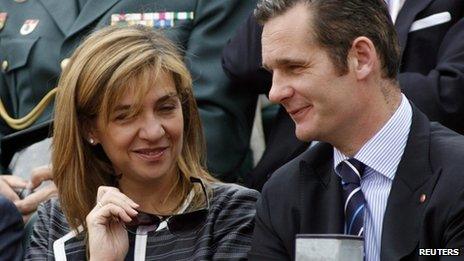
Princess Cristina and her husband Inaki Urdangarin deny any wrongdoing
The latest decision, to once-again make her a formal suspect and summon her to court in March to be questioned over allegations of money laundering and tax fraud, is now based on further investigating by the prosecuting judge.
Some of the allegations against the princess centre around the fact that she co-owned a company called Aizoon with her husband, and the firm allegedly received public money, which had been inappropriately obtained by Mr Urdangarin's Noos foundation.
It is claimed the couple then used some of the money for personal gain.
Neither has been charged in the case and Mr Urdangarin denies he has done anything wrong.
Prince 'popular'
Now that the princess is due to appear in court, it is clearly much harder for Spain's royal household to distance her from the corruption allegations surrounding her husband.
There is though the question of how much more damage the scandal will do to the reputation and image of Spain's royals.
El Mundo's Royal Correspondent Ana Romero believes it has already done "an amazing amount of damage", a view which is supported by a recent poll carried out by the newspaper, which found that 62% of people wanted King Juan Carlos to abdicate.
The poll also found that 78% of 18- to 30-year-olds wanted the king to step down.
And just over half of respondents said they did not support the monarchy - a finding that will cheer those in Spain who fondly remember the country's Republican past.
The only ray of light from the poll for monarchists is that two thirds of people had a favourable view of Prince Felipe, the king's son and the first in line to the throne.
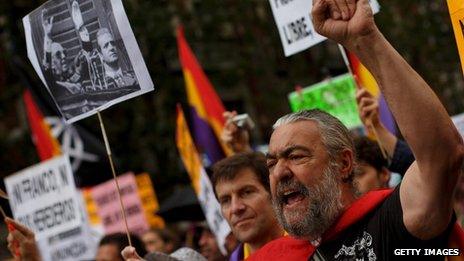
Anti-monarchist groups in Spain feel they are gaining ground
King Juan Carlos has noticeably aged recently, and has had numerous operations.
Spanish journalists spoke of the way Spain's head of state struggled to give a speech on Monday, at an annual military ceremony.
Then there have been rumours of extra-marital affairs and the king's public apology after he went hunting elephants in Botswana at the height of the economic crisis.
Royal correspondent Ana Romero believes the king could abdicate at some point, but not any time soon.
"There has been talk about abdication for some time now, but conventional wisdom says he has to stay the rest of the year now, to clear all of the problems for his son," she says.
And privately, royal officials back that view, arguing that if the king were to step down at a time of scandal in the media, it would only weaken the institution of the monarchy in Spain.
- Published7 January 2014
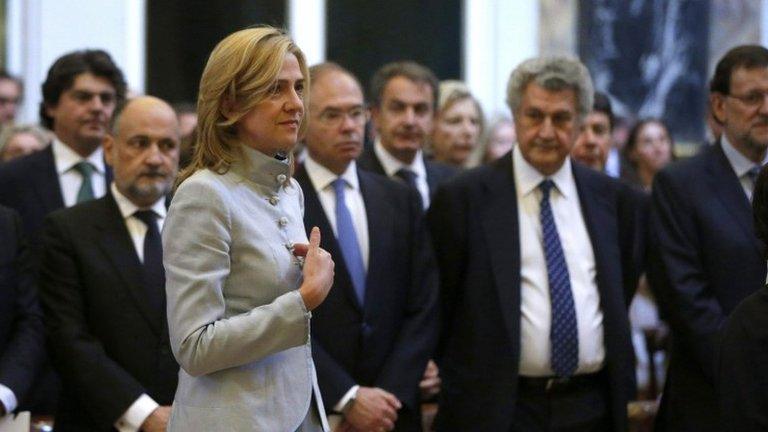
- Published4 November 2013
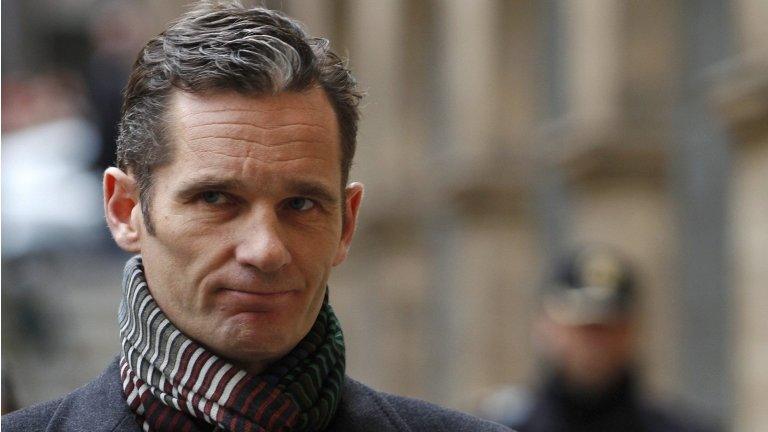
- Published3 April 2013
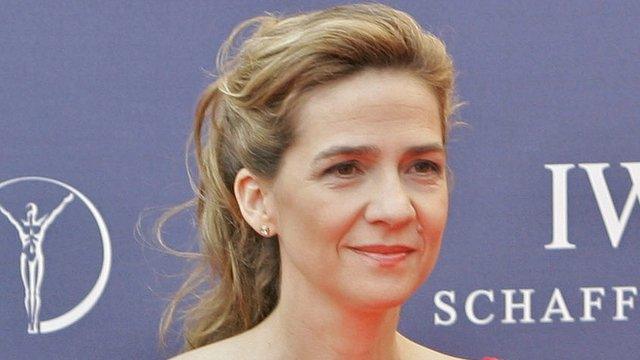
- Published21 August 2023
